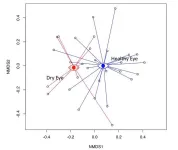(Press-News.org) Peer reviewed – randomised controlled trial - humans
Giving out free e-cigarette starter packs in hospital emergency departments to people who smoke helps more people quit – according to research from the University of East Anglia.
The trial, funded by the National Institute for Health and Care Research (NIHR), offered advice, an e-cigarette starter pack and referral to stop smoking services to people attending A&E for any reason, to help them to stop smoking.
Six months later, almost one in four people given the starter packs said they had quit smoking. And those who received the packs but didn’t quit altogether, were more likely to have reduced the number of cigarettes they smoked.
The trial, which was run by the Norwich Clinical Trials Unit at UEA, took place across six UK hospitals, and the research team now hope that the initiative will be rolled out to hospitals nation-wide.
Dr Ian Pope, from UEA’s Norwich Medical School and an emergency physician, said: “Emergency departments in England see more than 24 million people each year of whom around a quarter are current smokers.
“Attending the emergency department offers a valuable opportunity for people to be supported to quit smoking, which will improve their chances of recovery from whatever has brought them to hospital, and also prevent future illness.
“Smoking killed almost 75,000 people in the UK in 2019 and it is the leading cause of preventable death and disease in the UK.
“Swapping to e-cigarettes could save thousands of lives. We believe that if this intervention was widely implemented it could result in more than 22,000 extra people quitting smoking each year.”
Trial co-lead Prof Caitlin Notley, also from UEA’s Norwich Medical School, said: “Many people who smoke want to quit, but find it difficult to succeed in the long term.
“Electronic cigarettes mimic the experience of cigarette smoking because they are hand-held and generate a smoke-like vapour when used. They can be an attractive option for helping people switch from smoking, even if they have tried and failed in the past.
“We know that they are much less harmful than smoking tobacco, and that they have been shown to help smokers quit.
“About half of all people who smoke will die prematurely, losing on average 10 years of life, and for every death caused by smoking, approximately 30 more people are suffering from a smoking-related disease.
“Smoking-related cancers, respiratory and cardiovascular diseases severely impact people’s quality of life as they get older and are a huge cost burden for the NHS.”
The study, co-designed and managed with the help of Norwich Clinical Trials Unit, ran over 30 months across six hospitals in England and Scotland – at the Norfolk and Norwich University Hospital, the Royal London Hospital and Homerton University Hospital in London, Leicester Royal Infirmary, Addenbrooke’s hospital in Cambridge and the Royal Infirmary of Edinburgh.
A total of 972 people who smoked who agreed to take part were randomly assigned to receive either smoking advice, an e-cigarette starter pack and referral to local stop smoking services - or just ‘usual care’ written information about locally available stop smoking services.
Both groups of patients were asked if they were still smoking one, three and six months after they attended hospital. Those who reported quitting after six months were asked to undergo a carbon monoxide breath test.
Dr Pope said: “Those recruited were from neighbourhoods with high levels of deprivation and more people were unemployed or unable to work due to sickness or disability than the average.
“23.4 per cent of the vape intervention group reported having quit smoking six months after they attended the emergency department, compared to 12.9 per cent of the usual care group. This shows that people were twice as likely to quit smoking having received the intervention than not.
“7.2 per cent of those in the vape intervention group and 4.1 per cent of those in usual care group were confirmed to have quit smoking by undergoing a carbon monoxide breath test(1).
“We also found that people who had received the vape intervention but did not quit smoking were more likely to reduce the number of cigarettes they smoked and more likely to have tried to quit compared to the usual care group.
“This shows that helping people quit smoking whilst they wait in the emergency department is effective.
“It also shows that the emergency department offers a chance to reach people who may not otherwise be motivated to quit, or who might not have the knowledge or resources to access stop smoking services.
“It also confirms that e-cigarettes are effective at helping people to quit smoking,” he added.
“Based on these results we feel hospital emergency departments are a valuable opportunity to support people to quit smoking and policy makers should seriously consider it as a location for smoking cessation interventions.”
This research was led by UEA and the Norfolk and Norwich University Hospital in collaboration with the University of York, the University of Leicester, the University of Edinburgh, University Hospitals of Leicester NHS Trust, Barts NHS Trust, Cambridge University Hospitals Foundation Trust, NHS Lothian, Homerton University Hospital NHS Trust, and Nuffield Department of Primary Care Health Sciences.
‘Cessation of Smoking Trial in the Emergency Department (COSTED): a multi-centre, randomised controlled trial’ is published in the Emergency Medicine Journal.
As this was only a trial, people who smoke are reminded that A&E departments are not currently handing out free vapes. Help to stop smoking is available at https://www.nhs.uk/better-health/quit-smoking/
END
Handing out vapes in A&E helps smokers quit
2024-03-27
ELSE PRESS RELEASES FROM THIS DATE:
Shared digital NHS prescribing record could avoid nearly 1 million annual drug errors
2024-03-27
Implementing a single shared digital prescribing record across the NHS in England could avoid nearly 1 million drug errors every year, stopping up to 16,000 fewer patients from being harmed, and saving up to 22 lives every year, suggests a modelling study, published online in BMJ Quality & Safety.
The figures, which are based on the assumption that such a system could reduce medication errors by at least 10%, and by as much as 50%, could also save £millions for the NHS, say the researchers.
Previously published research suggests that drug errors cost the NHS £98 ...
Stanford Medicine-designed AI tools tackle soft tissue sarcomas, identify new treatment strategies
2024-03-26
Using novel machine learning tools developed at Stanford Medicine, researchers have mapped three distinct cellular configurations that correspond to clinical outcomes for patients with a rare, difficult-to-treat cancer called soft tissue sarcoma.
In particular, the technique identified a cellular neighborhood that correlated with a positive response to immunotherapy, which may help physicians make treatment decisions.
“These cancers are challenging,” said Everett Moding, MD, PhD, an assistant professor of radiation oncology. “Up to half of patients diagnosed with a primary tumor will develop distant metastases, but we don’t have a good way to predict ...
ARPA-H awards Columbia researchers nearly $39M to develop a living knee replacement
2024-03-26
A team of researchers from Columbia University Irving Medical Center (CUIMC) and Columbia Engineering has been awarded up to a $38.95 million contract from the Advanced Research Projects Agency for Health (ARPA-H) to build a living knee replacement from biomaterials and human stem cells, including a patient’s own cells. ARPA-H is a federal funding agency that funds transformative biomedical and health research breakthroughs, rapidly translating research from the lab to applications in the marketplace.
The Award
The award, part of the ARPA-H’s Novel Innovations for Tissue Regeneration ...
How genes work together to shape how much you smoke
2024-03-26
Take a puff of nicotine for the first time, and your DNA plays an important role, alongside social and environmental factors, in shaping what happens next.
In recent years, scientists have identified thousands of genetic variants believed to influence everything from when people first try smoking to how good that first cigarette feels to how often they light up and how hard it is to quit. Some variants influence how quickly we metabolize nicotine, while others underlie how sensitive we are to it. But little is known about how they interact with each other and with other genetic differences.
A new University of Colorado Boulder study sheds unprecedented ...
University of Oklahoma engineer receives NSF CAREER Award to advance gas sensing technologies
2024-03-26
NORMAN, OKLA. – Binbin Weng, Ph.D., an engineering professor at the University of Oklahoma, has been awarded a National Science Foundation CAREER Award presented to early-career faculty with the potential to serve as academic role models in research and education. The $497,370 grant will fund his project “Enabling New States of Light in Mid-Wave Infrared Photonics for Gas Sensing Applications.”
Weng says there is a growing demand for distributed gas sensing networks capable of continuously monitoring gas threats on a broad scale. However, current technologies face significant challenges in size, power consumption ...
More than meets the eye: Researchers uncover the microbial secrets of dry eye
2024-03-26
Researchers have used advanced sequencing technology to determine how the mix of microbes present in patients with healthy eyes differs from the mix found in patients with dry eye. The new work could lead to improved treatments for various eye problems and for diseases affecting other parts of the body.
Microbial communities in and on our body — collectively referred to as the human microbiota — play an essential role in keeping us healthy. Although many studies have focused on microbial communities in our gut, understanding the microbiota present in other body sites is critical for advancing our knowledge of human health and developing targeted interventions ...
Researchers identify microbes that help plants thwart parasite
2024-03-26
Bacteria that could help one of Africa’s staple crops resist a major pest have been identified by researchers at the University of California, Davis. Their findings, published March 26 in Cell Reports, could improve yields of sorghum, a mainstay of food and drink in West and East African countries.
About 20 percent of Africa’s sorghum crop is lost due to witchweed (Striga hermonthica), a parasitic plant that steals nutrients and water by latching onto the plant’s roots.
In the new study, UC Davis researchers show that soil microbes induce changes in sorghum roots that make the plant more resistant to infection by witchweed. They ...
Late surgical repair for preterm babies born with inguinal hernia shows better results compared to early repair, study finds
2024-03-26
Delaying surgical inguinal hernia repair in preterm infants until after discharge from the neonatal intensive care unit (NICU) appears to reduce the likelihood of serious adverse events, according to researchers at UTHealth Houston.
A study led by first and corresponding author Martin L. Blakely, MD, MS, MMHC, professor of surgery and pediatrics with McGovern Medical School at UTHealth Houston, analyzed the safety of early versus late surgical repair for preterm infants born with an inguinal hernia. The findings were published today in the Journal of the American Medical Association (JAMA).
“The biggest question we wanted ...
Two plant extracts with potential as GLP-1 agonist weight loss pills are identified by AI-based analysis
2024-03-26
*Note - This is an early press release from the European Congress on Obesity (ECO 2024) Venice 12-15 May. Please credit the Congress if using this material*
Two plant compounds with potential as GLP-1 agonist weight loss pills have been identified in an AI (artificial intelligence)-based study, the European Congress on Obesity (ECO 2024) (Venice 12-15 May), will hear.
Glucagon-like peptide-1 (GLP-1) receptor agonists such as semaglutide and tirzepatide are highly effective at helping people lose weight. By mimicking the action of a hormone ...
nTIDE March 2024 deeper dive: Gender employment gap narrows among people with disabilities post-COVID
2024-03-26
East Hanover, NJ – March 26, 2024 – The shifting landscape of post-COVID-19 employment highlights a reduction in the gender employment gap among individuals with disabilities, a trend not observed among those without disabilities, according to last Friday’s National Trends in Disability Employment (nTIDE) Deeper Dive Lunch & Learn Webinar.
While men and women with disabilities have similar rates of employment, the data do not address whether women with disabilities in the workforce have lower-quality ...




